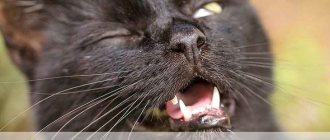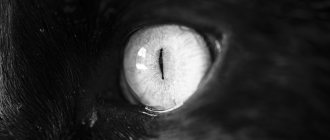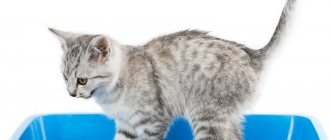Causes
Sneezing is a reflex process. With its help, the animal’s body gets rid of various irritants that have entered the nasal passages. If dust, dirt, hairs, or fluff gets into a kitten's nose, he will sneeze, trying to get rid of them. These are physiological causes that do not require treatment.
It’s another matter when sneezing is provoked by external and internal causes that negatively affect the health of the animal. These may be the following conditions and diseases:
- Allergic reaction. Cats can also suffer from the negative effects of poor ecology, react to strong odors, such as perfumes and aerosols, suffer from dust mites and other types of allergies. A sneezing attack can be triggered by cigarette smoke, plant pollen, odors of household chemicals, mold, cosmetics, air fresheners, even common kitchen seasonings.
- Bronchial asthma. Most often it appears as a complication after a severe allergy.
- Respiratory diseases caused by various infections. Typically, such diseases are accompanied by various additional symptoms that make it possible to distinguish them from other manifestations.
Possible diseases if a kitten sneezes
In addition to the above viral infections, possible diseases that cause sneezing in a kitten can be of a different nature. Unfortunately, the range of diseases is so wide that only a veterinarian can cope with the diagnosis.
The most dangerous are viral diseases, against which the kitten must be vaccinated.
If you pick up a baby on the street or buy it at a poultry market, the resulting viral diseases can cause its death.
Possible diseases of which sneezing may be a symptom are:
- Infectious peritonitis occurs without symptoms for a long time, and at an early stage of the clinical picture it is similar to a cold.
- Feline immunodeficiency virus is a slowly and secretly developing disease that adversely affects the body's immune system. When the cat's immunity level declines, it becomes vulnerable to any, even basic respiratory infections.
- Feline viral leukemia - in the first stages of development, is similar to a respiratory infection, in fact, it is a serious viral disease, which most often leads to death.
- Chlamydia - gives a complete picture of an acute viral respiratory infection complicated by bacterial infection. Unfortunately, chlamydia is highly contagious and common. One of the first symptoms of chlamydia is acute conjunctivitis.
- Mycoplasmosis is common, like chlamydia, contagious, and deadly. Mycoplasmosis progresses more slowly, but leads to more severe consequences: bacterial pneumonia and swelling of the respiratory tract.
Most viral infections cannot be diagnosed with guaranteed accuracy. To detect infection, blood is taken from the cat and examined for the presence of antibodies.
With viral infections, everything is a little more complicated; the causative agents of the disease must be found in the blood sample. This diagnostic method is called PCR. Unfortunately, PCR diagnostics are not available in all clinics and cost a lot of money, so most veterinarians, suspecting a viral infection in a kitten, begin complex, aggressive therapy.
Associated symptoms
When sneezing, a kitten may suffer from a runny nose, inflammation of the eyes, and discharge from them, including purulent discharge. A kitten who is sick with an infectious disease or has a severe cold or hypothermia will not only sneeze. He will have difficulty breathing, runny nose, tears, shortness of breath.
As the temperature rises, the animal refuses to eat, becomes lethargic, and tries to hide from people. He may develop vomiting, and if the bronchi and lungs are affected, characteristic gurgling and wheezing breathing occurs.
This condition threatens the pet's life.
In what cases is a visit to the veterinarian necessary?
You will not be able to handle treatment on your own if your kitten has contracted a viral infection. Your ward can survive if his immunity is strong enough to cope with the infection on his own. However, survival of kittens during viral infection is the exception rather than the rule.
In what cases is a visit to the veterinarian necessary:
- You know that your kitten has been in contact with virus carriers - it was picked up on the street, taken from a shelter, bought at a poultry market and does not have a vaccination document.
- The kitten has severe swelling of the eyes and ulcers on the mucous membranes.
- Against the background of loss of strength and severe depression, fever is observed.
- Constant drooling, copious nasal discharge, purulent discharge from the ears and eyes.
- Weight loss while maintaining appetite or a decisive refusal to eat.
- Enlarged lymph nodes.
- Wheezing or whistling when breathing, cough with or without phlegm.
- Breathing problems.
- Severe problems in the digestive system.
In addition, you should contact a veterinarian if the kitten does not have a severe clinical picture, but the sneezing continues for more than 3-7 days. Some viral infections develop secretly.
Immediately after infection, the kitten exhibits some symptoms, however, the immune system fights them. Under pressure from the immune system, the virus weakens, but remains in the body until the opportunity arises.
Treatment method and prognosis
Treatment is always related to the cause of the disease. If this is due to the animal’s environment, you need to remove the source of the allergy or irritation: remove poisonous or flowering plants, stop using caustic household chemicals, carry out a thorough cleaning and do not smoke, do not use aerosols or perfumes in the room where the kitten is.
Diseases should be treated only after consultation with a veterinarian, since only a specialist can determine the diagnosis, select medications and doses for a small kitten.
If you act on your own, you can seriously harm your pet.
How to help a kitten at home
Any disease requires timely diagnosis and professional treatment. But mostly, owners limit themselves to home methods of fighting the disease for 1-2 days. After this, the kitten often recovers if the disease is not severe and does not require surgical intervention.
If the kitten has a common cold, you need to provide the pet with warmth, give him plenty of warm liquids and his favorite food. You can also buy vitamins or cat grass at a veterinary pharmacy. A light massage of the shoulder blades will help, it will speed up blood flow.
It would also be a good idea to wipe the kitten’s eyes and nose with a weak solution of potassium permanganate or chlorhexedine.
If your nose is stuffy, you can rinse it with any of the following solutions:
- Novocaine 1% + Adrenaline;
- Tannin 0.5%;
- Ethacridine 0.2%;
- Zinc sulfate 2%.
If rinsing the nose does not help, and the situation has only worsened, you need to switch to the antibiotics Tobrex or Ciprofloxacin.
The use of Tetracycline ointment or Mastiet Forte oil suspension has proven itself to be effective. Use these products to lubricate your pet's nose 2-3 times a day.
As a rule, these measures are enough to help your kitten overcome a cold at home.
You should not give your kitten Paracetamol, because... For these animals, this medicine is toxic and may cause internal bleeding.
For what other diseases can you provide first aid to your pet:
- allergies: treat with antihistamines;
- infections: viral: antiviral and anti-inflammatory drugs;
- bacterial: antibiotics, immunotherapy;
- fungal: antifungal agents (pour into the nose);
What to do at home
There cannot be a definite and simple answer here; it is necessary to strictly follow all the doctor’s recommendations and not self-medicate.
A sick kitten should be kept warm and well fed. Since it may be difficult for him to eat due to a stuffy nose, it is best to give him soft, high-calorie, but easily digestible food. You need to make sure that he always has access to clean water and under no circumstances give him cold foods, including drinking.
Prevention of colds, infectious and viral diseases in kittens
Prevention of viral diseases is considered an essential aspect of kitten care. It is important to understand that even the highest quality vaccines do not guarantee that the kitten will not get sick. However, statistics show that vaccinated animals infected with a viral infection tolerate the disease much easier.
Note! According to generally accepted recommendations, the kitten should be kept in quarantine until it receives basic vaccination.
The mother’s immunity protects the baby only until the age of three months, after which the kitten’s body will have to fight pathogens on its own. Prevention of colds and bacterial diseases includes high-quality care and comprehensive protection of the pet from contact with sources of infection. The source of infection can be stray animals, places where garbage accumulates, wild rodents, etc.
Possible consequences of a cold
It can be difficult for cat owners to understand that the disease is not typical for a small predator, and the complications, if left untreated, are extremely dangerous. A cat's illness rarely poses a danger to the human body, but can be transmitted to other four-legged and feathered inhabitants of the apartment.
If you ignore the primary symptoms and do not start treatment in time, the disease progresses to a serious stage.
Typical complications:
- bronchitis,
- pneumonia,
- joint damage,
- genitourinary infections.
Also, the immune system weakened by the disease is a poor “protector” for the animal. Viruses brought by the owner on street clothes and shoes can easily infect a sick body.
When to see a doctor
After vaccination, it is better to wait half an hour rather than leave immediately. This is necessary to make sure there is no allergic reaction. If it becomes difficult to breathe, there is a feeling of a strong heartbeat, tinnitus, rash, dizziness, or swelling of the face begins, you need to contact the vaccination center for medical help.
You should also consult a doctor if after vaccination:
- headache, weakness or fever does not go away within three to four days;
- high fever is not brought down by medications;
- Redness and thickening at the injection site increases on the second or third day.
Prevention
A cold is not dangerous for an animal with normal immunity, but the disease causes discomfort to the cat and is quite difficult to treat. It is much easier to prevent infection. The following measures help with this:
- Proper care of animals. For the first few weeks of life, kittens should be kept in a warm, draft-free room. Trays and sleeping places for adult animals should also not be in rooms with cold air.
- Gradual adaptation to the street. You need to start this procedure in the warm season. The cat is allowed outside for several hours. In this case, you need to ensure that the animal does not become hypothermic. In rainy and windy weather, walks are avoided.
- Proper bathing. The cat needs to be bathed with warm water. After the procedure, the fur is thoroughly dried with a towel, while the pet should be in a warm room.
- Proper nutrition. The diet should include balanced food and sufficient fluids. Do not give your cat cold food or water.
Why does a cat get a cold?
A cold occurs in a cat as a result of hypothermia. During contact with cold, due to drafts, the pet’s immune system malfunctions. This creates the most favorable environment for the attack of viruses and microbes. In addition to hypothermia, there are other factors that contribute to the occurrence of colds, the most common among them:
- Weakening of the immune system due to previous diseases.
- Walking in the rain and wind.
- Finding an animal in drafts.
- Change of usual food.
- Unvaccinated animals with chronic diseases suffer from colds more often.
How to live with a cat if allergies are confirmed?
Based on the diagnostic results, it turned out that your body reacts specifically to the cat, but you do not want to part with your pet. What to do? By following a number of recommendations, you can reduce the likelihood of exacerbation of allergies:
- Try to pet the animal less, do not kiss it. After being held, wash it with soap.
- Regularly give your cat water treatments and brush her
- Replace the open tray with a closed one
- Do wet cleaning as often as possible, at least twice a week
- Don't forget to ventilate the rooms several times a day.
- Air washers will help clean the room from flying microparticles
- If possible, remove all carpets, bedding, and soft toys. Put things in the closet immediately
These rules will help you get along with your tailed friend in the same house. But their observance requires care and patience.
Nasal rinsing
After reading the article, the owner will know what to do if the kitten sneezes. You should be prepared for the fact that the veterinary clinic will prescribe a nasal rinse with saline solution or chlorhexidine. Representatives of cats cannot stand this procedure, resisting with all four paws and teeth. The kitten must be wrapped in a towel or blanket before proceeding. The step-by-step instructions look like this:
- Warm the solution to room temperature.
- Draw the required amount into an insulin syringe without a needle.
- Hold the kitten between your knees. If there is an assistant, he sits the baby on his lap, supporting his muzzle with his right hand.
- Raise your pet's head and carefully pour the solution into the right nostril. The animal will begin to snort and sneeze. You need to wait a while, giving it the opportunity to get rid of excess liquid.
- Carry out a similar manipulation with the left nostril.
- Remove the remaining solution from the muzzle with a paper towel or soft napkin.
Treating a cat for sneezing
Only a veterinary specialist at the clinic can prescribe the correct treatment for a cat with symptoms of sneezing. If, during a clinical examination of your cat, a veterinarian determines that your cat is clinically healthy, he will recommend that you wet clean your apartment and use a special humidifier.
If the cause of sneezing is allergic in nature, then recommendations will be given to eliminate the allergen present in the apartment or to ensure that household chemicals are inaccessible to your cat. In order to alleviate the condition, a veterinarian will prescribe one or another antihistamine to your animal.
In the case where the cause of sneezing is polyps, it will be recommended to remove them surgically in a veterinary clinic.
If a cat's sneezing is accompanied by an asthmatic attack, antispasmodics, vasoconstrictors and corticosteroids are prescribed.
In case of diseases of the oral cavity (teeth, gums), a sick cat is given dental treatment, tartar is removed (tartar in cats), inflammation of the gums is relieved, and vitamins are prescribed.
If a helminthic infestation is detected in a cat during an examination, the veterinarian will prescribe special anthelmintic drugs.
If the cause of a cat’s sneezing is an infectious disease diagnosed in the clinic’s laboratory, then the sick animal will be prescribed antibacterial and antiviral drugs and immunomodulators.
The oncological cause of sneezing in a cat is eliminated by performing surgery to remove the tumor and prescribing a course of chemotherapy.
Why do adverse events occur after coronavirus vaccination?
The vaccine familiarizes the immune system with the virus, and an immune response is launched in response to foreign interference.
A local reaction occurs - in response to damage to the skin and the introduction of the vaccine, cells of the first line of defense rush there. They must prevent the spread of infection that has been able to overcome the skin barrier. This is manifested by swelling and redness at the injection site.
The vaccine then enters the bloodstream. This forces the immune system to react to a possible threat and triggers defense mechanisms. Antibodies are produced to remember and destroy the invading virus. In addition, the body seeks to weaken the enemy and prevent the virus from multiplying quickly while the antibodies look for a way to destroy the enemy. One way is to heat the body, since many viruses cannot tolerate high ambient temperatures.
All together this can cause a typical reaction: fever, muscle weakness, headache. How severe the adverse events will be depends not so much on the vaccine, but on the individual characteristics of the body. After all, one person tolerates the same infection calmly, while another with a temperature of under forty. Most patients do not experience any reactions after vaccination.
Preventive measures
If a kitten sneezes, we told you what to do and how to treat it. To avoid the occurrence of a sneeze reflex, it is recommended to follow some rules:
- Refrain from smoking in the apartment.
- Remove flowers that provoke allergic reactions from the house.
- Maintain cleanliness - wipe the dust and wash the floors in a timely manner.
- Do not neglect vaccinations against cat flu, leukemia, etc. Conduct them starting from the age of three months.
How does a cold manifest in cats?
Colds in cats. The symptoms of viral diseases in cats are similar, however, successful treatment is only possible with the correct diagnosis. Therefore, when your pet shows signs of a cold, you should urgently consult a specialist. Tests may be needed to determine the virus that causes the illness. Colds are more common in kittens due to their rather weak immunity. The main symptoms include:
- increased body temperature (nose becomes dry and hot)
- lack of appetite
- runny nose and sneezing
- heavy breathing, cough
- tearfulness
- apathy, etc.
Newborn kitten sneezing
If your baby coughs and sneezes immediately after being born, there may be two reasons:
- A newborn was born with a pathology - cleft palate. The cleft in the palate does not allow him to breathe normally or to suck on the nipple normally. When milk enters the mouth, it does not go into the esophagus, but upward, clogging the nasal passages. The result is coughing, sneezing, and milk bubbles through the nose.
Is it worth keeping such a kitten? Debatable. There is an option to go out before 1.5 months, but surgery to fuse the palate is done only at 3 months. At 3 months, the kitten is still too weak for general anesthesia; 90% of its little heart will not survive this. You decide.
This pathology is not the inheritance of the cat, it is the inheritance of the cat. Change the manufacturer next time, and this disaster will pass you and your cat.
- The mother cat was tired from giving birth and did not lick the newborn kitten’s face well, and the kitten still had postpartum mucus in its nose and throat. This mucus prevents him from taking a full breath and exhaling and receiving the first important portion of colostrum from the mother's nipple. When you try to draw in air (or milk), coughing and sneezing begins. Clean your baby's passages with a wipe, baby enema bulb, or syringe without a needle, sucking out excess fluid from the nose and throat. In a minute or two, your newborn will “come to life.”
The cat has a cold and is sneezing: what to do?
If your pet is sneezing, coughing, the nose is dry and hot, the eyes are watery, there is no appetite, breathing is difficult, you should give the cat first aid.
Algorithm of actions:
- Carry out a visual inspection, analyze whether the disease is the result of a viral infection.
- Place the sick person in a comfortable, warm place, making sure there are no drafts.
- Put a heating pad on if the animal is cold.
- Give plenty of warm water and milk. Cold drinks are prohibited.
- Massage your body to increase blood circulation.
- Offer nutritious food.
If after two or three days the pet’s condition remains unchanged, you must visit a veterinary clinic, where the doctor will make an accurate diagnosis.
Treating a kitten for a virus
This subsection is for informational purposes only; all manipulations are carried out only after an accurate diagnosis has been established. Medicines are prescribed by a veterinarian, who also explains how to use them.
Has your kitten caught a viral infection? The specialist will prescribe antibiotics and anti-inflammatory drugs. Among the first, the most common are “Maxidin” and “Fosprenil”, which kill viruses in the baby’s body. “Baksin” and “Gamavit” are responsible for restoring a pet after an illness.











